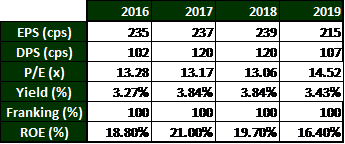Caltex Australia Limited (ASX: CTX)
Caltex Australia Limited is the leading provider of transport fuels in Australia, providing about 20% of the total fuel market. In addition to being a vertically integrated supplier of fuel, Caltex operates Australia’s largest convenience retail network of fuel and convenience sites trading under the Star Mart brand; with more than 620 stores and over 320 franchisees. Roughly 70% of Caltex’s income comes from convenience store income from company operated stores, franchise fees, royalties, property, plant and equipment rentals and income from the company’s fuel card (Starcard). In July 2012 Caltex announced a restructure of their supply chain, including the conversion of the Kurnell refinery to a major import terminal. Margins within the refining business had been under pressure for some time, and the closure was a significant positive for the company. Macro headwinds were affecting crude production and pricing. Caltex has done well to reduce their exposure to the vagaries of this market. On schedule, in October 2014, the Kurnell refinery was safely shut down and terminal operations commenced on site. The new, modern terminal at Kurnell is Australia’s largest fuel import terminal. The clear strategy is to focus on optimising the entire supply chain from product sourcing to the customer.. Given recent negative press surrounding its franchise model and the ACCC’s decision to block a major transaction in the industry, the share price has fallen, and we revisit Caltex as an investment opportunity.
1H Results
The underlying Replacement Cost of sales Operating Profit (RCOP - excludes the unintended impact of the fall or rise in oil and product prices) NPAT came in at $621m, 18% ahead of prior year ($521m) and at the top end of guidance, stemming from strong performances from marketing and distribution as well as improved refiner margins. Underlying Marketing and Supply EBIT grew 5% by $38m to $776m (vs $738m in 2016) as Caltex sold more high margin vortex diesel and jet volumes than prior year. This translated to higher transport fuel margin of $1,188m vs $1,066m in 2016. The higher margin and increase in earnings from lubricants and specialty fuel, up 13%, offset higher operating costs; coming in at $482m vs $424m in 216. Lytton EBIT was up $103m on prior year as Caltex Refiner Margin (CRM) for 2017 was US$12.87/bbl vs US$10.29/bbl in 2016.
Update on the ACCC and BP’s Acquisition of Woolworth’s Petrol Stations
In December 2017, as discussed in our newsletter back in June last year, the ACCC blocked BP’s proposed acquisition of the Woolworths fuel division.
In December 2016 Woolworths announced it would not be accepting Caltex’s bid to purchase all of its 527 fuel convenience stores and 16 development sites. Instead, Woolworths and BP were to develop a joint fuel convenience store called Metro at BP after the retailer agreed to sell its petrol stations to BP for $1.70 billion. The deal ended the intentions of Caltex to buy the service stations & expand its marketing outlets, and was supposed to reduce its fuel distribution capabilities via an existing distribution deal with Woolworths. At the time we thought this was a smart decision by Caltex, despite the negatives, as the acquisition implied an EBITDA multiple of 10.5x, which, in our opinion was too high.
The primary reason behind the ACCC’s decision was a fear or a reduced competition in the sector, with BP commanding 39% of market share post acquisition. It is not yet know if BP will try and overturn the decision on appeal, or walk away from the deal altogether. So far the commentary from Woolworths indicates that there are other interested parties in its fuel business if BP steps away from the table. Recently press speculation suggests that PeroChina might be a possible bidder. Fuel distribution is an important value add component of the Woolworths acquisition (Caltex currently supplies their fuel) and it is prudent to assume the potential acquirer would cancel Caltex’s 3.5bn litres/annum fuel supply deal. However, given the ACCC’s decision, it is unlikely an existing national fuel distributer will make an offer for the Woolworths stations, as any deal would likely face the same issues around a reduction in competition in the sector (Additionally, Caltex had their proposed acquisition of Mobil petrol station’s blocked by the ACCC in 2009). This means that likely acquirers (e.g. PetroChina) will be international players not yet represented in Australia. With no existing operations in Australia, international players would not be in a position to take over the full range of fuel logistics operations involved in importing and distributing fuel to WOW sites, putting Caltex as a front runner in continuing to supply the petrol stations (at least in the short/medium term).
Despite this Caltex continues to fill the void, that will be potentially left by the end of the Woolworths deal, by purchasing additional stations and increasing its convenience store foot print. Caltex has recently made two acquisitions; Milemaker and Gull NZ.
Issues with Franchisees
Caltex announced in February, that it will scrap all of its petrol station franchises by 2020, bring all sites back under company control. This is a decision made on the back of the dark cloud surrounding surround the broader franchising model and the completion of company review. A Fairfax investigation revealed that large franchisee networks (including Caltex) were fraudulent, underpaying staff and committing wage fraud. Caltex maintain that the timing of the decision to end its franchise model and allegations fraud were a coincidence. Caltex has said that a two-year review of the franchise model had found that controlling its core business was the best way to achieve its "retail growth objectives". It would spend up to $120 million bringing the remaining 433 franchise stores, run by 237 franchisees back under its control. The review has also split Caltex’s operations in two segments; lubricants and oil and its retail convenience business. Caltex will no longer be paid franchise fees, but it will use its extended control to explore new retail platforms including its Foodary stores and Nashi coffee bars.
Foodary
- Trails have taken place and have been successful, generating 35% higher sales.
- Caltex will roll out the Foodary format to 55 sites in 2018 then evaluate performance before rolling out more.
Nashi
- Upmarket sandwich shop
- Caltex will trial this format with 5-10 sites in 2018
We view this as a good move, given that the convenience in Australia lags compared to similar markets overseas, and think Caltex is in a good position to expand its retail sales.
With existing sales of $1billion, the decision to focus on retail has paid off so far. The next step in Caltex’s plan is to remove fuel being the draw to visiting a Caltex petrol station. The company plans to bundle, fresh food, coffee, postage collection and laundry to fight against lower fuel volumes and monetise increased time spent in stores as electric cars continue to gain popularity (electric cars take 30 minutes to charge). In the U.K. petrol stations account for 60% of convenience sales, in Australia it is only 20%.
Summary
Aside from the negative press around franchisees, refining margins seems drive Caltex’s short term share price movements, the key point to remember is that 80% of the value in the business sites in the Marketing and Supply business. The key assets that (at this stage) provide Caltex with its defensive moat are the Kurnell import terminal and Lytton refining terminal, combined providing 20% of Australia’s fuel. This infrastructure is unique and cannot be replicated from either a logistical/physical or economic perspective. These are world class assets that provide high barriers to entry in the space.
Caltex continues to place emphasis on its retail convenience business, making smart acquisitions and brining the franchised sites back under company control. Caltex has a strong track record of generating a high return on capital and has outlined strategies to generate higher sales from an underutilised retail sites.
Trading on a P/E of 13x and paying a grossed dividend of 5.4% we find Caltex to be compelling value.
Key Financials

1 topic
1 stock mentioned

